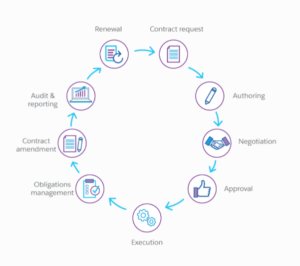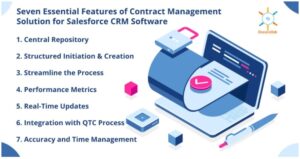7 Tips to Create Better Contract Management Reports in Salesforce
When you create better reports in Salesforce, you improve your contract management strategies. So how do you build better reports? This article covers essential tips to help you and your team do just that.
Between 60-80% of businesses operate using contracts or service agreements. Generating reports regarding these contracts enables corporations to manage them efficiently.
Before you review the tips for creating better contract management reports, let’s take a moment to understand what contract management reports do for companies that use them.
What are Contract Management Reports?
At a basic level, contract management reports deliver notifications concerning the status of a contract. That includes due dates, renewals, and other agreement landmarks.
These reports enable companies to better control the processes to:
- Lower labor costs
- Show contract errors
- Avoid business loss due to contract issues
- Improve relationships with customers and vendors
Reports allow you to generate a lasting record of products and services that customers purchase or subscribe to using Salesforce contracts management tools. These records include contracts made with vendors, business partners, and employees.
7 Tips to Create Better Salesforce Contract Management Reports
Integrating contracts with your Salesforce CRM ecosystem allows legal teams to collaborate more efficiently with sales staff. Here are a few tips on how to create better contract management reports in Salesforce:
1. Define the Goals
Defining your goals is the foundation of crafting effective contract management reports. Data-driven success requires a framework.
Meet with stakeholders and set the goals collaboratively to help paint a clear picture of developing report criteria. If the aim is further compliance or to address legal issues that continue to present themselves, outline how the information in these reports can solve these concerns.
2. Streamline the Data
Although Salesforce designed reporting tools to manage vast amounts of data from various sources, overloading your dashboards with information will produce data with little value.
Once you have defined goals with stakeholders, consult with your data sources to determine which insights and metrics align with organizational objectives.
Streamline your data by working collaboratively with legal and sales teams to determine how to set up these reports. Choose the most effective key performance indicators (KPIs) regarding selected data points.
3. Automate the Contract Lifecycle
Contract automation advances the creation of contract management reports. It does this from the collaboration, negotiation, eSignature, and post-signature contract process.
Automating a contract lifecycle affect the following stages:
- Create: The moment you deliver the agreement, you can save it in Salesforce and make it visible to anyone who is authorized. You can create contracts in Salesforce and have peace of mind knowing they are immediately live synced.
- Collaborate: You can discuss with stakeholders and legal teams in real-time. Together you can address specific clauses directly. There is no need to email the legal department regarding edits.
- Negotiate: Automated contract management enables you to negotiate with the legal team and sales staff in-browser. If you make changes based on the negotiations, they reflect immediately in Salesforce.
- Agree: Participants can eSign on any device with automated processes. Once signed, you can set the PDF to store automatically in Salesforce and email it to either legal or members of the sales team.
- Store/Manage: Legal teams require contract visibility post-closing. Legal and sales teams can be confident all documents are accurate with two-way live-synced integration.
When you automate the process, you free your legal team to work on other aspects that add value to the company. You also enable sales teams to be more efficient.
4. Customize Contract Set-Up
Tailor your internal contract management process for reporting using Salesforce. You can do this by:
- Enabling contract expiration notices
- Determining if you need auto-calculation of contract end dates
- Tracking history for every contract status
- Showing contract, quote, or opportunity details
- Enabling chatter feed for each contract
5. Offer More Access to Data
An analysis tool will also enable you to maximize the value of your Salesforce contract management reports. You can grant access to individuals, entire departments, or just C-suite members through the dashboard.
Transparency is a vital component for ongoing growth and success. Provide team members with Salesforce-based report training (and grant them permissions) to guarantee they benefit from the data.
6. Ensure Legal Retains Control of Salesforce Contracts
Your legal team is the one department that should always retain control over Salesforce contracts. While not every member of your staff will need access to contracts, the entire legal department will.
You can offer self-service functionality for sales staff that enhances their workflows, but members of the sales teams won’t need control over contract documents. Furthermore, every contract a salesperson manages must go through the legal department.
7. Track, Refine, Repeat
Companies often overlook the necessity of refinement of their contract creation process. What works today may not be as effective tomorrow. Taking time to track and improve upon contract management reports creation is something your organization must prioritize.
Periodical reviews and feedback from sales staff and legal teams will help you improve the function and designs of your reports. Doing this will ensure that you get the best ROI for your efforts.
Benefits of Salesforce Contract Management Reports
Contracts are an essential part of doing business. They promote compliance and are legally binding. They also protect your company and limit liabilities. The image below outlines seven essential features of contract management solutions for Salesforce.
Incorporating Salesforce with your contract record systems can reduce human error. Salesforce contract management reports lessen discord between legal and sales teams. That way, legal can enable sales to close faster.
Create Better Reports with Rainmaker’s Salesforce Integration
Leverage the power of technology with Rainmaker’s Salesforce integration services to simplify creating and generating contract management reports. We are here to help your company achieve its goals, remain compliant, and mitigate risks associated with contracts and service agreements.
Are your sales and legal teams struggling to create the reports they need for contract management? Contact us today for ways we can help.








